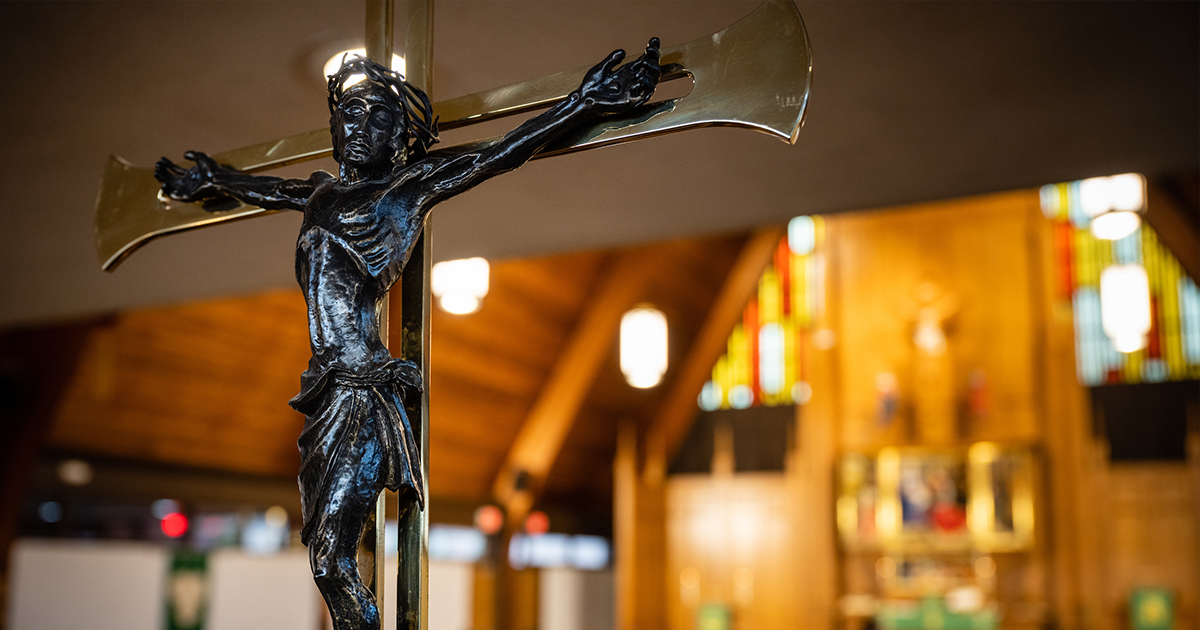
By Roy S. Askins
On Jan. 21, several hours prior to the start of the National March for Life in Washington, D.C., Lutherans preparing to march gathered for the Divine Service at Immanuel Lutheran Church, Alexandria, Va. As worshipers knelt in silent contemplation and confession of their sins, the cry of an infant broke the silence.
It is no coincidence that these marchers began at church. Deaconess Tiffany Manor, director of Life Ministry for The Lutheran Church—Missouri Synod (LCMS), explained the connection: “We like to start with a Divine Service in which we receive the forgiveness of sins, lament the lives lost to abortion, and are strengthened through the Word preached to us and the Sacraments received.”
Following the service, worshipers exited the church, led by the processional cross. “The liturgical statement of the crucifix leading us both toward the altar and, later, out of the church is a statement that in this alone is the good that overcomes the world’s evil,” preached the Rev. Christopher Esget, senior pastor of Immanuel and fifth vice-president of the LCMS. Esget continued, “The march for life is a march behind the cross.”
The sound of young children was not limited to the sanctuary at Immanuel. Despite the bitter cold, every age — from young child to seasoned adult — marched for life. Danele Otten, a member of St. Paul Lutheran Church in Hamel, Ill., who was participating in the march for the first time, said, “What struck me the most was how many of the participants seemed to be under the age of 30.”
Others also noted the youthfulness of the marchers. “There’s something very salutary about [confessing the truth] in front of people, especially for young people,” said the Rev. Dr. Matthew C. Harrison, president of the LCMS. “This [march] is an act of confession before a hostile world that does not want the confession.”
The Rev. Harrison Goodman, content executive for Higher Things, an LCMS Recognized Service Organization, said, “It’s a gift to be here, to celebrate that Christ our Lord has been crucified for fetus and mother alike, that in all of these things, we might find hope … in Him who has brought us out of death into life.”
A ministry of hospitality
In this, its 49th year, the event had a decidedly optimistic tone. Many marchers expressed the hope that current cases before the U.S. Supreme Court, specifically Dobbs v. Jackson Women’s Health Organization, might lead to overturning or restricting the 1973 case, Roe v. Wade, which forced every state in the U.S. to permit the murder of unborn children.
But while marchers were optimistic about potential change, they also recognized the need for continued work. The overturning of Roe v. Wade, if it happens, will not spell the end of abortion in the U.S. Rather, it will return the issue to each state to decide.
“We know that we do not wage war against flesh and blood, so we will continue to speak up for the vulnerable and pray that the Lord defends them,” said the Rev. Peter Brock, senior pastor of St. John Lutheran Church in Decatur, Ind.
Furthermore, the overturning of a Supreme Court case will not change hearts, explained the Rev. James Douthwaite, pastor of St. Athanasius Lutheran Church in Vienna, Va., and a member of the LCMS Board for International Mission. “It’s a good step,” said Douthwaite, “but … only the Gospel can change people’s hearts to … love … and speak up for life.”
Loving life includes providing resources for struggling families after a child is born, a theme that echoed throughout the march and surrounding events. The Rev. Dr. Jonathan Shaw, director of LCMS Church Relations and assistant to the LCMS president, describes this as a “ministry of hospitality.”
“When a [family] is struggling with an unplanned gift from God, we need to receive them with open arms, offer real support … [and] walk with them in care for the child,” Shaw said.
In addition to advocating for life and teaching all generations about the sanctity of human life, the LCMS remains dedicated to supporting families in need after the birth of a child. LCMS Life Ministry recently announced the Million Dollar Life Match, a grant program to help congregations start and sustain ministries “to support mothers, their children and families across the nation.”
LCMS congregations can get involved in numerous ways. Douthwaite noted the importance of supporting local pregnancy centers with more than just money. “They need our help and support financially [but also] by being present with them,” he said.
LCMS congregations interested in building a ministry of hospitality that welcomes and provides for families in need should visit lcms.org/life and consider applying for a Million Dollar Life Match grant.
Posted March 3, 2022